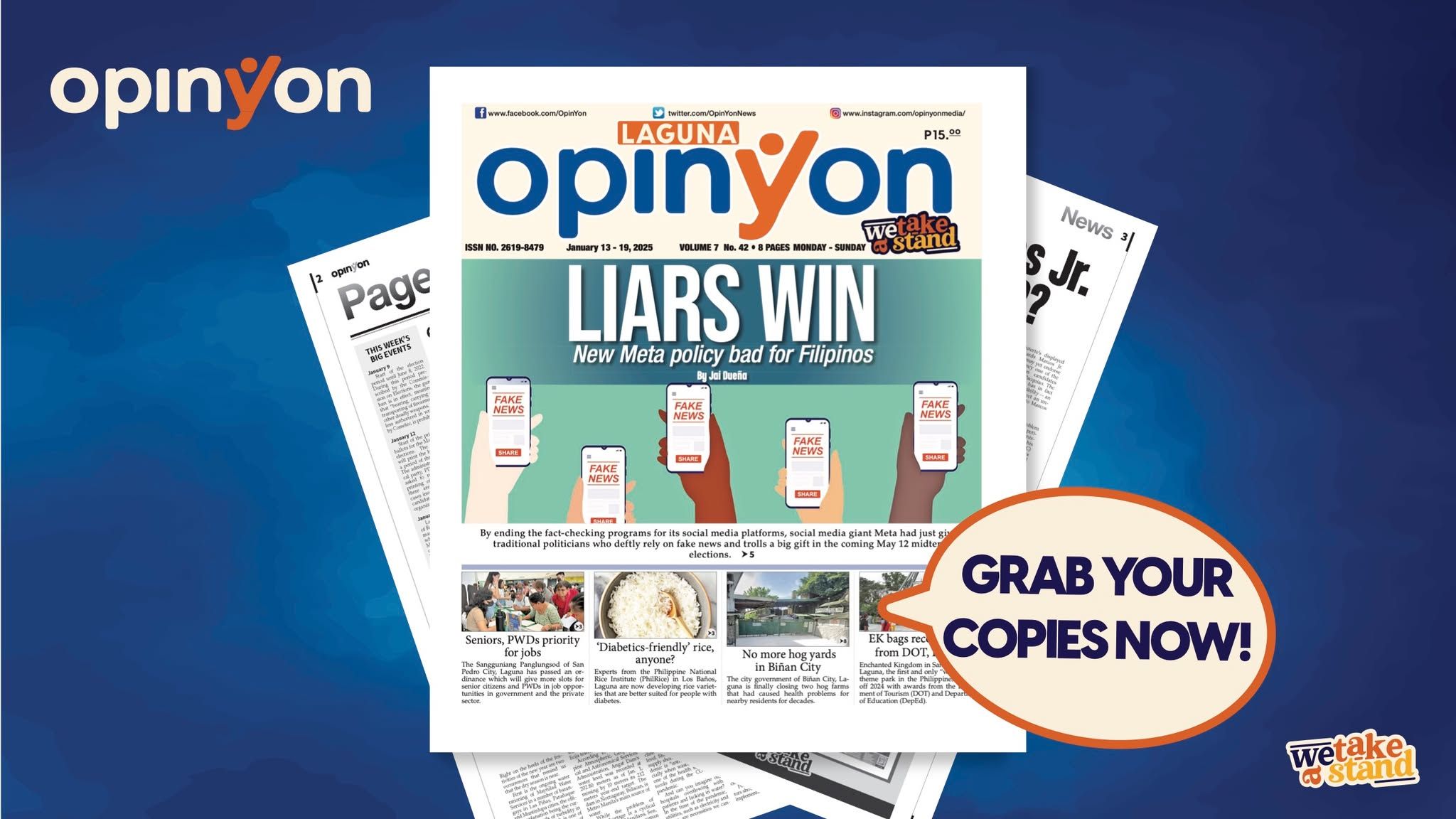No matter how much his camp and his supporters deny it, it’s a big open secret that the proliferation of fake news on social media, among other factors, scored President Ferdinand “Bongbong” Marcos, Jr. his victory in the 2022 presidential elections.
This year, as the May 12 midterm elections loom large, those seeking to sow discord and disinformation on social media have found themselves an unlikely ally: social media itself.
This comes through an “unrelated” but equally worrisome development: Meta, which currently operates two of the largest global social media networks, has announced that it will end fact-checking for its social media platforms.
Last January 8, Meta founder Mark Zuckerberg said that fact-checking programs on its social media sites – Facebook, Instagram and Threads – will be replaced by
community notes (similar to those found in Elon Musk’s X, formerly known as Twitter) where users can add notes to a post.
“We’re going to get back to our roots and focus on reducing mistakes, simplifying our policies and restoring free expression on our platforms,” Zuckerberg said in a video.
Meta’s fact-checking program started when it was widely criticized for its part in misinformation and disinformation during the 2016 elections in the United States. However, Meta noted last year’s US elections as one reason for ending the program and “prioritizing (free) speech.”
Disinformation galore
Critics such as Nobel Peace Prize laureate Maria Ressa of Rappler had condemned Meta’s actions, saying that Zuckerberg may have actually given manipulators and liars free rein to spread disinformation on social media.
In a statement issued on January 8, Rappler said that “allowing manipulative and harmful content to flourish and gain eyeballs in platforms under the guise of ‘free speech’ is opportunistic and puts people’s health, well-being, and safety at risk.”
After all, it’s no secret that in the Philippines, disinformation is a major player in elections.
That is at least according to reports of one of Meta’s third-party fact-checking partners Vera Files.
In a 2017 report, it said that the most viral fake news is driven by Facebook shares and is spread by a network of pages.
Concerning the upcoming 2022 elections then, Vera Files reported that out of 336 viral online posts they’ve debunked from January 1 to December 10, 120 were related to the elections.
“Of this number, 52 either promoted Marcos, who is aspiring for the presidency in the May polls, or distorted facts about his family’s ill-gotten wealth cases and the atrocities committed under the administration of his father, the late dictator Ferdinand Marcos Sr,” the report stated.
Useless?
On the other hand, some critics are quick to point out that Meta’s fact-checking
is already not working even before the announcement.
“But let’s not beat around the bush: the fact-checking did not work in the first place. As per usual with Mark Zuckerberg and Facebook, it was nothing more than halfhearted lip service to correcting itself and owning up to critics— and maybe designed to not work,” online journalist Jamie Dunkin said in an article posted on The Nightly.
“How often would you see clearly, egregiously wrong material get flagged and taken down? How often would content that went beyond disinformation actually get pinged?” he added.
Last year, OpinYon Laguna published an article talking about paid trolls and fake news sites proliferating in the province as the election nears.
Quick research also shows that some of the mentioned paid trolls are still operating and even ‘intensifying’ their malicious demolition jobs against political rivals.
Alternative
Still, even with its flaws, others argued that Meta’s fact-checking program has actually helped Filipinos navigate through the increasingly blurred lines of fake news.
“This decision will make it even more difficult for Filipinos, and the audience in general, to sift through the flood of information online,” said National Union of Journalists of the Philippines Chairman Jonathan de Santos.
Zuckerberg’s alternative “Community Notes,” after all, is basically putting fact-checking at the mercy of the public regardless of the user’s credibility and qualifications.
But some critics like Dunkin are hoping that this alternative will at least be “a tad” more effective than the former program if it follows the community notes Musk introduced.
“For all the faults with X, Community Notes have allowed egregiously wrong claims and dangerous advertisements to be easily and quickly debunked, with a mostly well-meaning army of armchair detectives sorting fact from crap,” Dunkin insisted.
However, for the widely uneducated and tech-illiterate Filipino users partnered by weak laws and poor implementation, it is fair to assume that this new policy is a welcome to more paid trolls and disinformation which means upholding the truth will be even harder for Filipinos this midterm elections.
(With report by Miguel Raymundo)
#WeTakeAStand #OpinYon #OpinYonNews #CoverStory
